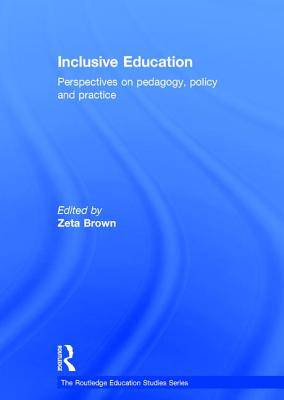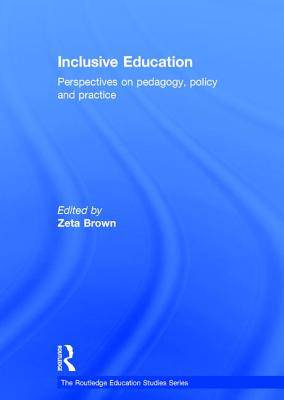
- Afhalen na 1 uur in een winkel met voorraad
- Gratis thuislevering in België vanaf € 30
- Ruim aanbod met 7 miljoen producten
- Afhalen na 1 uur in een winkel met voorraad
- Gratis thuislevering in België vanaf € 30
- Ruim aanbod met 7 miljoen producten
Inclusive Education
Perspectives on Pedagogy, Policy and Practice
Omschrijving
Inclusive education is complex, multi-faceted and ever-changing and to date there has been no fixed definition of what is meant by the term 'inclusion', leading to confusion about what inclusive education actually means in practice.
This key text introduces readers to the underlying knowledge and wider complexities of inclusion and explores how this can relate to practice. Considering inclusion as referring to all learners, it surveys the concept of inclusive practice in its broadest sense and examines its implementation in a variety of educational institutions.
Throughout the book, international contributors consider this broader concept to critically evaluate the realities of practically implementing inclusive objectives. Each chapter assesses key theories and concepts alongside a range of examples to encourage students to think critically and reappraise their own experience as learners.
Key topics covered include:
- studying the definition of inclusion
- the relevance of pedagogy in inclusive practice
- how to lead and manage for inclusion
- the issue of inclusion in early years, primary, secondary and post-16 settings
- inclusive practice for families
- international perspectives on inclusive practice.
Fully illustrated with tasks, case studies, discussion questions and recommended reading, Inclusive Education is essential reading for second and third year students looking to extend their research and writing, and to develop their critical and reflective thinking.
Specificaties
Betrokkenen
- Uitgeverij:
Inhoud
- Aantal bladzijden:
- 180
- Taal:
- Engels
- Reeks:
Eigenschappen
- Productcode (EAN):
- 9781138913899
- Verschijningsdatum:
- 29/04/2016
- Uitvoering:
- Hardcover
- Formaat:
- Genaaid
- Afmetingen:
- 175 mm x 246 mm
- Gewicht:
- 520 g

Alleen bij Standaard Boekhandel
Beoordelingen
We publiceren alleen reviews die voldoen aan de voorwaarden voor reviews. Bekijk onze voorwaarden voor reviews.










